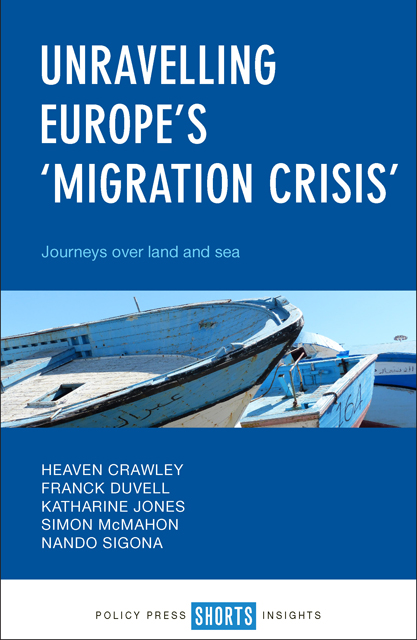Book contents
- Frontmatter
- Contents
- List of figures
- List of boxes
- Acronyms
- Notes on the authors
- Acknowledgements
- Foreword by Joanne Liu
- one The view from Europe
- two Unravelling Europe’s ‘migration crisis’
- three Not one route but many: unpacking migration to Europe
- four The decision to leave
- five Navigating borders and danger: the use of smugglers
- six Moving on
- seven Across the sea… and beyond
- eight Rethinking Europe’s response
- References
- Index
seven - Across the sea… and beyond
Published online by Cambridge University Press: 21 April 2023
- Frontmatter
- Contents
- List of figures
- List of boxes
- Acronyms
- Notes on the authors
- Acknowledgements
- Foreword by Joanne Liu
- one The view from Europe
- two Unravelling Europe’s ‘migration crisis’
- three Not one route but many: unpacking migration to Europe
- four The decision to leave
- five Navigating borders and danger: the use of smugglers
- six Moving on
- seven Across the sea… and beyond
- eight Rethinking Europe’s response
- References
- Index
Summary
In 2015 the political, policy and media focus was very much on the dangerous and difficult journey across the sea. Even today this largely remains the case. In this chapter we explore our respondents’ experiences of the sea crossing and also what happened when they arrived on the shores of Europe. Just as the sea crossing was not the beginning of the story, neither was it the end. Although the focus shifted towards the end of 2015 onto the movement of people up through the Balkans to the countries of Northern Europe, there were also other movements taking place which are rarely acknowledged or spoken about in policy debates. These included the movement of refugees and migrants from Greece to countries other than those in Northern Europe, including Italy and Malta, typically seen as arrival rather than destination countries. In addition, European countries also created their own movement, largely through enforced returns under the Dublin Regulation which continued despite media stories to the contrary.
Crossing the Mediterranean
It is too risky to go back across the desert. It is better to cross and risk your life in the sea than go back. (Nigerian man aged 26)
The decision that refugees and migrants took to risk their lives and, in many cases those of their children, by boarding a boat to cross the Mediterranean becomes easier to understand in the context of knowing what happened to them before they reached the sea. As is clear from preceding chapters, journeys over land were dangerous, with danger coming from a variety of different sources: from smugglers, from state officials, from challenging terrain and from ‘bandits’.
More than three-quarters (76%) of those interviewed in Italy and Malta said that they had been on the receiving end of physical violence from someone during their journeys before reaching the Mediterranean. Almost a third (29%) had witnessed the death of a fellow traveller, sometimes a family member, along the way. People from West African countries (Gambia, Nigeria, Senegal, Ghana and Côte d’Ivoire) experienced the highest levels of violence en route, perhaps reflecting the greater length of their journeys and greater number of border crossings. Along the Central Mediterranean route, most reports of violence occurred in Algeria, Niger, Chad, crossing from Eritrea into Sudan and, overwhelmingly, Libya.
- Type
- Chapter
- Information
- Unravelling Europe's 'Migration Crisis'Journeys Over Land and Sea, pp. 111 - 128Publisher: Bristol University PressPrint publication year: 2017



